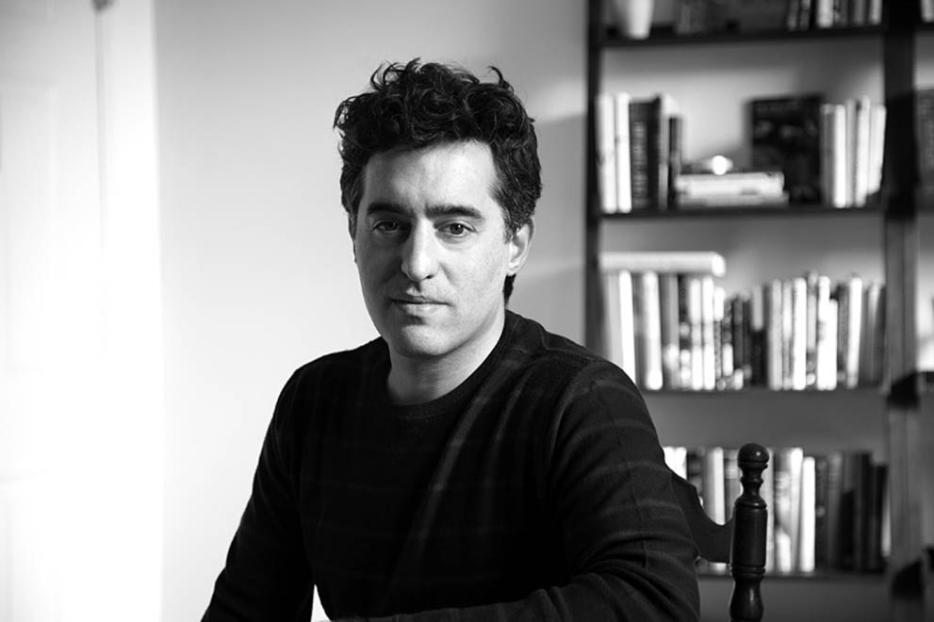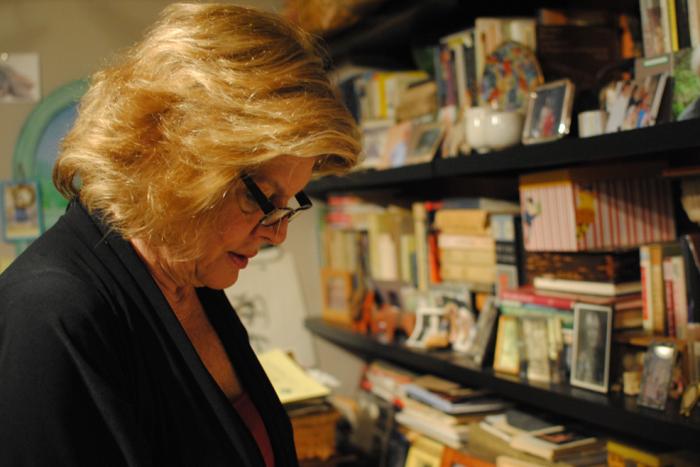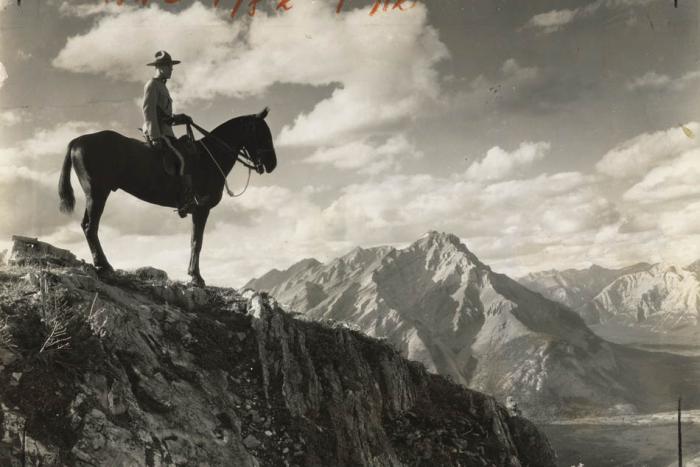Listening to Nathan Englander talk is like tuning between five different radio stations, all broadcasting the same story in a slightly different way. Keeping up with his frequent and hilarious parentheticals—addressed more to himself—is as rewarding as it is strenuous. To compare his frenetic conversational style with the elegance of his fiction, one imagines that writing is a way for Englander to splay his options out before him and select the one that says it best of all.
Englander is a writer in love with his options, moving from short fiction to translation, to a novel, back to short fiction, and now playwrighting. His first collection, For the Relief of Unbearable Urges, came out in 1999, followed eight years later by The Ministry of Special Cases, a novel that investigates Argentina’s Dirty War by way of a Jewish family caught in its Kafkaesque design.
This past February, Englander’s shrewdly titled What We Talk About When We Talk About Anne Frank was released, swaddled in some of the most glowing book jacket copy an author could hope for—no less than three literary Jonathans (Franzen, Lethem, and Foer) threw in their rapturous two cents. At 42, Englander is effusive and enthusiastic, maybe even a little incredulous about his success. Speaking about the title story—two couples, one American and one Israeli, get high and speculate on who would hide them in the instance of a second Holocaust—or the coming-of-age narrative in miniature, “How We Avenged the Blums,” Englander seems loath to conform to a particular intention or meaning, his own or anyone else’s. “The Reader,” a taut little allegory about an author’s connection to his reader, speaks to his fascination with that relationship.
He is perhaps sick of being asked about Jewish identity, which makes sense.
I met Englander in Toronto’s Intercontinental Hotel lounge, where we spent an hour girded by a number of couches newly delivered, upturned and cloaked in plastic. In town for Holocaust Education Week, Englander was slated to speak about the collective memory of the Holocaust, something that imbues much of his writing. And while his stories—I’m tempted to call them tales—have the streamlined lucidity of those by Babel, Malamud, or Carver, Englander’s work is undeniably present tense.
*
Your adaptation of “The 27th Man” is opening at the Public Theater next week. What was it like turning your own story into a play?
I’m utterly ignorant when it comes to the theatre, so it’s fun to be getting educated about it by terrifying people—like my director, Barry Edelstein, or [the Public Theater’s Artistic Director] Oskar Eustis. I’m more afraid of Oskar each time we talk. My theatre friends will ask me who the dramaturge is, and I’m like, “This guy named Oskar.” They’re like, “Yeah he’s pretty good at dramaturgy.”
Sometimes being naive is actually a little bit safer—you can have more confidence.
Say you score films and you’re like, “This guy Scorsese called me up, he needs some music and I’m writing it”—if you don’t have that reference point, you just do your work. Every day, I’m more deeply moved to have the play at the Public, and with that, it’s really good to go back your writing and do the work. You can be having wild anxiety, but it better be about the work.
The advice I always give is, the nice thing, or the Zen thing, or the monkish thing for work, for writing could just as easily match the most selfish, careerist thing. People who are consumed by jealousies: does that help? Is that going to help you write? Or is that going to freeze your brain up, or darken your soul. Same with this theatre thing—the absolute purity of ignorance and straight education.
It seems like Nora Ephron was instrumental in getting you to adapt “The 27th Man” into a play.
When my first book came out [For the Relief of Unbearable Urges], Nora read the story and made contact. I was told that Nora Ephron wanted to have lunch! And I said I would be very happy to have that lunch.
So that was your first time meeting her.
Yes, from infinity. She saw a play in that story. Nora optioned it and, I was like “I just want to write this novel first,” and very nicely she agreed to that. That took me ten years, and when I came back, she was waiting. This is the thing about people who really care about story and craft in the arts: what does she need to teach me how to write a play for? She cares about the story. When I started drafting the play four years ago, she was wildly involved. We’d have these meetings, always with food. We’d eat and work for hours and then she’d send me off. For months I would draft for her. And with such ease and tough love—which is the way I like to teach—she would draw a line through pages that I’d worked on forever. And I was like, “I gotcha.” And then when she felt we’d taken it to the place where it could be shown, she sent it to the Public.
Did you have to train anything out of yourself to shift from writing fiction to drama?
The breakthrough moment for me was understanding that I wasn’t writing another version [of the story]. Even just going from short stories to novels—I always say that if you have a successful story collection and then you write a novel, it’s like having done a successful gallery show and then suddenly someone gives you a torch and tons of steel and is like, “Make me a giant public sculpture,” and you’re like “Oh, I guess I have some ideas about aesthetic because I paint.” It’s that big a jump. My obligation was to the rules of drama. I think those early drafts were exactly what you’re asking.
What is the difference between writing dialogue in drama vs. dialogue in fiction?
When you write dialogue for fiction, the Writing 101 thing would be to think that dialogue isn’t how you speak, but how you speak in your brain. The idea of watching people do stuff makes for different rules… I had to learn a new time-space continuum for action.
And theatre isn’t always the easiest place to learn a new craft—you have to do it in front of so many people.
Oh, it’s exhausting! I have real stamina, and when I write, I write hard. I really worked on my discipline to sit and hammer it out. Seven days a week, I will work. It’s weird, this thing that involves everyone doing their craft at once, to each other. So it’s just utterly exhausting, and it’s vulnerable for everyone.
With a story like “The 27th Man,” I can see why.
They laugh at me still because I was like, “You guys hug each other a lot,” and I’m a hugger! My family: we hug. The play is hopefully humorous in places, but there are a lot of pretty emotional moments in it. Every day at some point in rehearsal, somebody’s weeping. That idea of raw emotion and craft shared—all these people dreaming specific elements and together creating one world. It’s both magical and overwhelming.
[Sudden strains of relaxed jazz]
You’re in Toronto for Holocaust Education Week, where you’ll be speaking about how we remember the Holocaust. What does that mean to you, the collective memory of it? Particularly in “What We Talk About When We Talk About Anne Frank.”
My sister and I are utterly shaped by the Holocaust and obsessed by it and think about it all the time. It’s such a part of our lives, except we’re fifth generation Americans. My brother-in-law, his father’s an Auschwitz survivor. He has a direct historical link—it’s his grandparents that were murdered, his uncle, his legacy.
If I were to ask you to tell me Holocaust symbols right now, you’d say “trains, gas chambers, boots, German shepherds.” Everything that you have has been educated into you, or came from media, or fiction, or movies. Who owns this material, and how do we remember it? How do we pass this on?
My belief, if you want to protect something, is that it needs to be a living thing. There’s the historical moment, the thing that happened, and then all the echoes from it—the genocide, the shattered families and all that. When we talk about it now, what are we talking about? Specifically, the delicacy of using a name like Anne Frank. There’s the person, and there’s the character. It all echoes out into infinity.
Something that comes up briefly in “How We Avenged the Blums” is the narrator referencing the “softness” of this quasi-sheltered group of young Long Island Jews. Was that drawn from your own experience growing up there?
That story is a fictionalized world, but we really did have a battle with the anti-Semites in our town. Here we are, half an hour from Times Square in our little suburban town, having this crazy battle. Very different to be a kid in Brooklyn, playing stick-ball and going to public school.
Your Israeli characters seem a lot tougher, or at least more blunt than the Americans.
I’m very interested in those perceptions of strength and weakness, because they’re both generalizations. In something like [The Ministry of Special Cases], I got interested in these Jewish gangsters because you hear a name like Shlomo [e.g. Shlomo the Pin in Ministry] and think, “Shlomo my accountant,” or “Shlomo has asthma.” You don’t think, “Shlomo will cut your fucking heart out and eat it in front of you while you slowly die in the street.”
I’m interested in the idea of a global fiction. Yes, the characters are Jewish, yes the subject’s Jewish, but I happen to be one of those people, and those were the only people I was ever exposed to. It would be like me reading a novel by a Christian person and saying, “How come your characters aren’t all Muslim?”
Americans who have never been to Israel get there and they say things like, “I saw a Jew driving a bus! I saw a Jew up a telephone pole!” And why wouldn’t a Jew be up a telephone pole?
I just saw a lot of them eating falafel.
Yeah! But like, that fighter pilot’s a Jew. The newscaster’s Jewish. This idea of feeling other, or watched, like this idea [in “How We Avenged the Blums”] where you can feel like the chased-home-from-school and not the chaser. It’s easier to be the victim. But I think that we work hard to self-perpetuate this, through those jokes that people make amongst themselves in front of the people they’re comfortable with.
That’s very true.
I taught for NYU in Paris in the summer, and I saw this kid, like, a kid with a yarmulke, sitting on a scooter, who really looked like he would maybe kill you for your watch? And I was so proud of him, I was like, “You’re the most terrifying kid in a yarmulke!” sitting there, smoking a cigarette, a 16-year-old on a scooter. A black velvet yarmulke, looking honestly like a really naughty hoodlum. That fills me with joy! I didn’t have that concept—that I could wear my yarmulke and sit on a scooter with a cigarette hanging off my lip. I’m interested in ideas of strength and weakness and how we perpetuate them, in that story in particular.
One of my experiences reading your work is discovering all the things I never realized I assumed about Jews. I mean, I’m a secular Jew—I don’t even know if secular Jew really even covers how secular I am—
I like to say “Radically Secular,” because that’s what I work for!
Radically secular, that’s good. It seems like your writing investigates how we—Jews and non-Jews alike—perceive concepts like “strength,” or “The Holocaust,” rather than the concepts proper.
It’s more about how does history work, how does memory function, how do truth and identity form. With The Ministry of Special Cases—15–30,000 Argentines murdered and disappeared—you don’t tell that story in an obvious way. One mother, one father, one son. I believe that fiction can build a hyper-specific world—characters that we come to know—through the singular and the individual. To me it’s the global ideas that are the exciting thing, or the driving thing in the story. “How We Avenged the Blums” is to me about morality—is it easier to be pursued or pursuer?
But as soon as you’re black, it’s African American literature, as soon as you’re gay—if I’m a girl and I like a boy, it’s an American novel, if I’m a boy and I like that same boy, now it’s gay literature.
Making it a genre rather than just fiction.
Which you’re welcome to do from the outside, but I never understand why I would be expected to see my characters as a qualified form of person. The Jewish Person. Most of what we read is unbelievably foreign to our own experience. You don’t read a mystery and say, “I enjoyed that mystery despite not having killed anyone!” Nobody says, “Can I give this mystery to my friend? He hasn’t killed anybody—I don’t know if he’d enjoy it.” Everyone has to be part of the world, because that’s what a book should do—it should feel to everyone like it’s theirs.
Like in your story, “The Reader,” there’s that passage where Author recalls his mother reading him the Babel story as a child—how he thought it was written just for him.
I’ve thought about that a lot, and that’s the feeling to me when I read things... and it’s not a fake feeling. That’s what work does when it’s functioning, when a story works. It is written for you, it is. What is a writer putting anything out into the world for except for that connection. You do know the writers that you connect with—you honestly have connected with those people, and they with you. I do think it’s two ways, or should be.
I guess an artist knows that they have an audience. They can probably assume that people have connected with their work.
Well, yeah. If you add like eighty gigantic doses of suffering and [the writer’s] assumption that it’s a construct and not really an audience. Not that everyone has to be miserable.There’s a humility, and one needs to be thankful. The goal is to make story, and if you only have one reader who gets it, then you really should consider yourself rich. I don’t know anyone doing serious work who takes that lightly. I think everyone still feels vulnerable.






